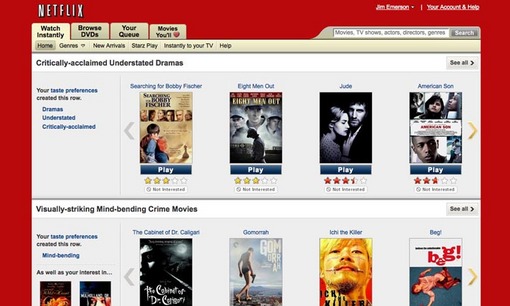Robert Siegel was interviewing Caterina Fake, co-founder of Flickr and now chief product officer for an Internet “taste-profiling” service called Hunch.com, on NPR’s “All Things Considered” the other day. It’s a software-driven inference engine of the sort you see all over the web these days that provides you with “if you like this, then we suggest you’ll like this” recommendations. Netflix has one, Amazon has one, iTunes’ relatively new “Genius” feature is one.
Here’s what Siegel said:
I must say, it remains a big question for me as to whether one can effectively quantify taste. I’ll give you an example. I, and it turned out, a contemporary of mine, we’re both baby boomers and both of us quit Netflix at precisely the same time for precisely the same reason, completely independent of each other, which was that after watching and liking “Garden State” a great deal, we got the message, if you like that movie, you’ll like “Harold & Kumar Go to White Castle.”
And somewhere in the first half hour of this movie I realized that someone had assumed I liked movies about doper teenagers in New Jersey and that was what made it. And you could write the algorithm easily. It just didnt get to the quality or the kind of movie at all. I was watching teenage entertainment.
“Yes, Mr. Siegel,” I shouted in my car, “because that’s what you told it you wanted! Garbage in – garbage out, dummy!” (Yes, I became Dr. Steve Brule for an instant at the end of that exclamation.) I was momentarily troubled not so much because “Harold and Kumar Go to White Castle” is infinitely smarter, funnier and more mature than “Garden State” (though that is obvious). And I’m not accusing Mr. Siegel of being one of those ubiquitous morons who doesn’t understand what a point of comparison is. After all, he provided three of them — “doper,” “teenagers,” “New Jersey” — in his remarks.
No, what really bugged me was that he took it personally, without taking personal responsibility for the result. (I was happy he used the word “algorithm,” though.) I’m as disgusted by the idiotic anthropomorphizing of computers as I am of the anthropomorphizing of animals. Algorithms do not read minds. If Siegel didn’t like “Harold and Kumar,” he should have given it a one-star rating on Netflix. That would have increased the chances that he’d get better recommendations next time. (Jeez, most of these services even tell you why the software is serving up a recommendation: “Based on your interest in…”)
Siegel did not say how many movies he’d actually rated at Netflix, or if he’d filled out the multi-leveled (and, I feel, rather silly) “taste preferences” questionnaire about what moods/qualities/genres he favors. Oh, and I’m not saying that the questionnaire itself is “silly.” I can see how it would be useful. I just mean that I feel somewhat silly rating such qualities as “Mind-bending” and “Understated” on a scale of 1 to 3.
There are two main ways these applications work: 1) by comparing the things you’ve said you like/don’t like with the tastes of other people who have similar likes and dislikes and recommending other things you may have in common; and/or 2) by comparing individual traits or genres (doper, teenage, New Jersey) — or, as I sometimes see served up on my Netflix homepage: “Dark Foreign Dramas from the 1970s” or “Scary Critically-acclaimed Polish Comedies.”
The recommendations can only be as good as the amount of information you’ve contributed to help, of course. I checked and I’ve rated about 1,200 movies on Netflix — which is really easy to do thanks to a cute little Java script. You just drag your cursor over the stars (or the “not interested” button) and click. Netflix does a pretty good job of predicting how I’ll feel about movies (it even predicts what star rating I’m likely to award) — and when I notice a movie I’ve seen that I haven’t rated yet, I quickly let it know what I think to confirm an accurate prediction or correct a faulty one.
Netflix uses the other method as well — which means that Siegel and his boomer friend may very well have each other to blame for that shocking “Harold and Kumar” recommendation — and they were not acting “independently” at all. Supposedly, they have similar tastes. Maybe they both liked not only “Garden State” but “Slumdog Millionaire,” “Donny Darko,” “Gran Torino,” “Brokeback Mountain,” “Sixteen Candles,” and “A Serious Man” — and they hated “Crash,” “Irreversible” and “Mulholland Drive” And some other people who gave those movies similar ratings also liked “Harold and Kumar Go to White Castle.” In that case, they are likely to get a recommendation for “Harold and Kumar,” because of a simple statistical correlation. It’s nothing personal, Mr. Siegel. It’s just business…











